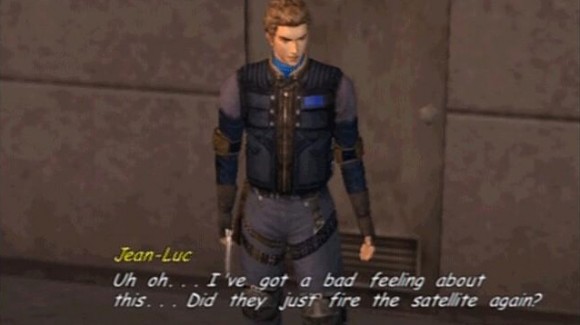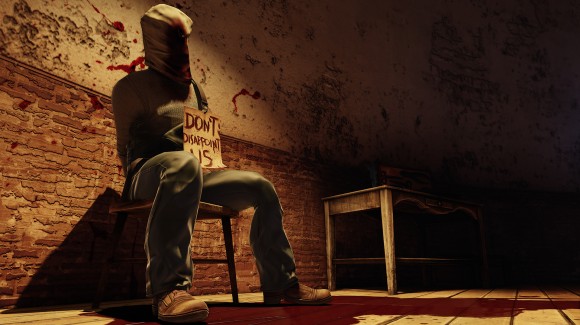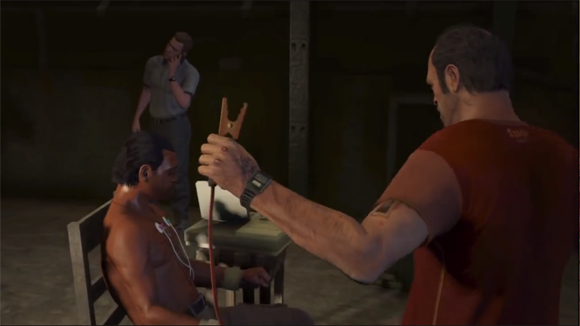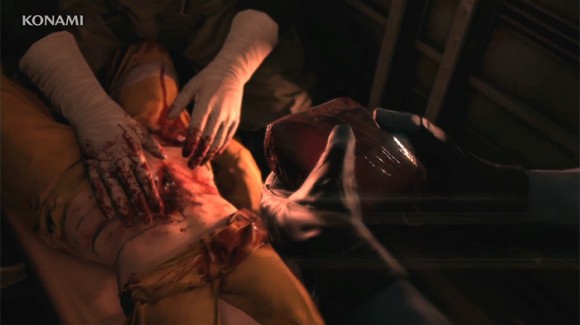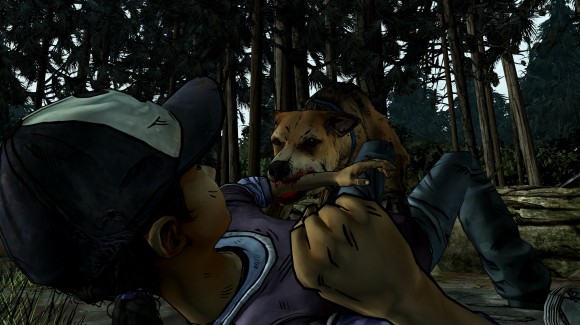*Warning, this article contains heavy spoilers for the following games: Assassin’s Creed: Freedom Cry, Grand Theft Auto V, Bioshock Infinite, Metal Gear Solid V Ground Zeroes, Walking Dead Season 2 and if for some reason you haven’t played it; Saints Row 2. If you intend to play any of these titles and don’t want them spoiled for you, read no further.
Back in the 80s and 90s games were always about funky cartoony mascots and little details of weirdness. I remember rocking my sweaters with multi-colored triangles and my flat tops as I would excitedly load up Bubsy Bobcat and avoid one hit kill cheese wheels or take my boomstick to my backwards alien possessed hick neighbors in Redneck Rampage. Video games were a lot of things, but aside from the odd RPG or Survival Horror title one would barely consider them very mature or able to tell compelling narratives.
Now with my shaved head and suit jackets I find myself playing video games that increasingly mirror cinema, and at times present unique narrative experiences not found in other mediums. It’s no surprise that the stories they tell us increasingly come packaged with a surprisingly dark edge, abandoning the weird and wacky from back in the day.
From the torture scene in Grand Theft Auto V to the splatter fest that is Hotline Miami we’ve had games that have challenged us directly with taboos and things generally accepted as morally reprehensible. At times we sit back and accept the right for these games to explore such themes, other times we loudly question why the game went down such a dubious route. Last year’s Bioshock Infinite was a particularly odd bird. Despite opening up to rave reviews, the game was later criticized for its heavy violence in an otherwise lovely Disney-esque world of wonder. Meanwhile the recent Metal Gear Solid V: Ground Zeroes features a particularly graphic scene where someone suffers as they’re operated on while still conscious. Yet Ground Zeroes is greeted with general audience acceptance that this is a messy world and is automatically allowed to contain gritty themes.
But is this right? Before I go on I want to say I’m not here to question the morals or the social implications of these games, but rather I’m challenging the story context. I think the immediate concession I have to make here is that any creator should be allowed to explore the themes and plot lines they desire as long as it doesn’t bring actual, real world harm to anyone. Just as it’s within my right to be offended, it’s also the creator’s right to offend me, that’s the beauty of creative platforms. Besides I don’t take offense to very much, though I do like my stories to be well conceived if someone is going to make the effort to craft one. So I would like to challenge anyone that reads this, from creators to critics to consumers, to think about what exactly is happening under the hood of the narrative while everything else goes on.
I strongly believe context accounts for a great deal as to whether you’re handling your mature themes in a, well, mature way. I have to question why a good number of folks called foul on the violence in Bioshock Infinite’s game world since contextually it made perfect sense. Bioshock wanted to illustrate the sub-dermal ugliness of Columbia under its dermal layer of beauty. These were the “themes” Bioshock attempted to explore which were made clear the moment the game took the player from a fun, relaxed carnival setting to a display of overt racism and classism against a mixed race couple. You were initially lulled to a sense of ease in Infinite’s universe, then the violence shocks you into just what a corrupt, disgusting place you’re now trapped in. It also further illustrates lead character Booker’s own bloodlust, what a cruel man he is, and how he stands to many in the narrative as a figure of bloody revolution and horrific war crimes, this is the very core of who he is and the game admonishes him for it later on.
So the idea of context needs to be applied when examining the content, it’s helpful to both the creator and the audience. It’s crucially important when determining whether a game’s themes are effective, or if they’re crossing a line simply for shock value. A great franchise to point to that uses shocking content to mixed effect is probably Saints Row. Saints Row is no stranger to death, drug use, prostitution, violence and so forth but the way they’ve handled it from installment to installment has varied. It’s also a franchise that exclusively follows a “rule of cool”, i.e. things happen in the games just because it’s awesome. Saints Row 2 in this writer’s opinion, used the rule of cool to very poor effect. When playing as a character simply called “The Boss” you end up dealing with a gang named The Brotherhood. They kidnap one of your friends, a kid named Carlos, and drag him a couple of city blocks from the back of a truck. After killing the truck’s drivers and a weak attempt to free Carlos on your part, you execute him. Later you get revenge on this act by kidnapping the Brotherhood leader’s girlfriend and setting her up to die at his hands, unbeknownst to him, as he brings a monster truck crashing down on a car where she’s trapped inside.
Both acts are supposed to be heroic. The hero that visited a mercy kill upon his tortured friend, and later got a clever revenge for his death. Only when you break things down, the entire set of actions was really a set of retaliations and escalations that wouldn’t have even happened without the Boss’s involvement to begin with. These acts were supposed to look cool, make the Boss seem like a badass operator, but really you end up being portrayed as a psychopath. Contextually the parts needed to give the Boss this heroic aura just didn’t fit together. In future installments of Saints Row, however, Volition would set up the Boss to be just that; a psychopath. So every action he, she, or “it” (you CAN be a zombie after all), did in the game was contextually justified. Now that the Boss is just a flat out psychopath, some of the insane actions they take come off as heroic. It’s also interesting because the character doesn’t necessarily have to be praised (Saints Row 2) or condemned (Bioshock Infinite) for darker themes to be effective, they just have to make sense to the narrative and follow basic writing tenants.
The more recent Grand Theft Auto V gave us a controversial scene that had everyone buzzing where psychotic protagonist Trevor is employed by the United States government to get information out of a target of interest. This translates, naturally, to torture. Part of what makes the scene so uncomfortable is that GTAV makes the player the party to torturing their subject. Electrocuting him, breaking his bones, waterboarding him, it’s all left up to your twisted hands. When you eventually stop the target’s heart, you have to start it up again and continue the torture session.
It doesn’t particularly feel very good, but it does add a lot to the narrative. It shows you just how far the characters of Grand Theft Auto V are willing to go in order to fulfill their goals. GTA V also takes it one further by having an amusing conversation between Trevor and his torture subject just after about how torture doesn’t work. Dan Houser definitely has a torch to burn with the United States and their supposed treatment of prisoners and implication of torture techniques. From a character perspective it puts a further cap on how chilling Trevor is, not just because he’s a monster, but because he’s an intelligent monster. The scene actually then accomplishes four things at once, illustrating the director’s stance, displaying character ambitions and coloring in character development while all advancing the plot.
This ties us well thematically to Metal Gear Solid V: Ground Zeroes. The game is centered around rescuing a spy named Paz Ortega, and as the game goes on you find out she was tortured…a lot. It’s strongly implied she was raped, as you carry her to the rescue chopper she begs you to kill her, finally you find the bad guy’s have mutilated her stomach and planted an explosive inside her. You need to get the explosive device out of her, and it needs to be done sans-anesthesia. Paz cries during part of the procedure as the medic digs around in her intestines attempting to find the bomb. Now, unlike Grand Theft Auto V the moment is not directly interactive and aside from a few controller vibrations you’re in the passengers seat. The moment is however very intense.
But is it necessary? Metal Gear may be a series that often deals with themes of war and war crimes, so that might be the immediate concession we give the game. Let’s put that aside for a moment however and consider the plot, Ground Zeroes entire scenario is centered around rescuing Paz (likely because she has information), bringing her to an escape helicopter and performing the procedure to remove the bomb. After her successful rescue and the surgery, she dies anyway thanks to another device implanted somewhere else in her body. In essence what ends up happening is the entire narrative loops back around to exactly the same place it was before it started, with no character developments and only a surface change to the story. Nothing was gained, there’s no real commentary, and as Paz didn’t die at the hands of the main characters they’re absolved of having the responsibility of her death. The entire sequence is further made moot by the fact Paz’s narrative ran its course and gave her a full arc in another game, Peace Walker.
Since nothing that happens to Paz matters to characters, narrative or gameplay the context ends up being torture for torture’s sake. It’s mostly there for the shock value of it, and while it definitely looks mature I say it’s probably an example of well disguised immaturity. Other games such as South Park: The Stick of Truth, Grand Theft Auto, Saints Row and Hotline Miami are all in some form a little juvenile and fairly comedic, but when handling similar themes to Ground Zeroes such as torture, rape or violence it’s to some kind of effect that advances some part of the game. Now Ground Zeroes is unique in that it can always be re-contextualized, Phantom Pain may provide the cause and effect missing in Ground Zeroes, but in the moment it fulfills no more utility simply than what it’s presented as.
A nice way to round this out is to give you a contrasted moment with Walking Dead Season 2. Clementine goes through a lot, and I mean a lot, over the course of the first episode. She’s chased by attackers, nearly drowns, bitten by a dog, dropped on her ass, locked in a shed, and that’s just the first half. It all culminates in Clementine having to steal medical supplies and treat her own gaping wound, pouring on the antiseptic and sewing herself up. The moment looks intensely painful, in fact Clementine has to keep from passing out, with each stitch a very graphic display of needle piercing through flesh. By the end of it you feel the ten year old has been through quite an ordeal.
You ask yourself, is it necessary? You have to go “absolutely.” Everything that happens to Clementine contributes to her character and who she becomes, yes it’s gratuitous but it lets you know how tough she is, how she’s young but can power through damn near anything. You come to accept her as tougher than some adults in her world, and you truly end up empathizing with who she is and what she has to go through. It’s all for the sake of character and story, making for a meaningful experience where it feels like these things happened for a reason.
So we started this on character brutality, let’s end on brutality. At the end of Assassin’s Creed: Freedom Cry Adewale literally hacks a man apart with a machete. The man Adewale kills is a French governor and a slaver who was cruel and vindictive. Somewhere during the plot he sunk a slave ship simply so no one else could get a hold of it and Adewale watched dozens of slaves die. One can assume Adewale’s “slaughter” of the slaver is called for. Well…kind of. Within Assassin’s Creed’s own lore they’ve created a culture where Assassins such as Adewale are typically smooth operators with a composed attitude. Adewale himself is presented as a level headed and thoughtful individual. Freedom Cry presents a violent outburst that’s supposed to be informed by the loss of life, but it misses the story beats and character traits that makes it feel called for. In proving to the slaver he’s not a savage monster Adewale ends up being a savage monster, not because he’s supposed to be, but because it’s simply not handled well.
There are a ton of examples I didn’t cover, such as a positive example with Joel’s brutality in Last of Us as it rubs off on an impressionable character and informs the entire arc of the narrative, while a game such as Shadow Warrior which I’m a huge fan of just has a lot of violence because ‘well that’s how Wuxia goes down’ without it actually being a necessary part of the plot. I do believe the rules of context should apply everywhere from a writing standpoint, but what challenges each individual’s sense as to what’s called for and what isn’t always comes down to that person and therefor makes the topic a little subjective. I just ask that before we call out content we find objectionable, or give a pass to something we would normally find taboo, we also consider the context. What statement is the developer trying to make here? What does it do for the characters and story, if anything? Is it successful in doing so? Then I think we can start to give a more informed assessment and better identify the failures and accomplishments of handling mature themes in video games.

